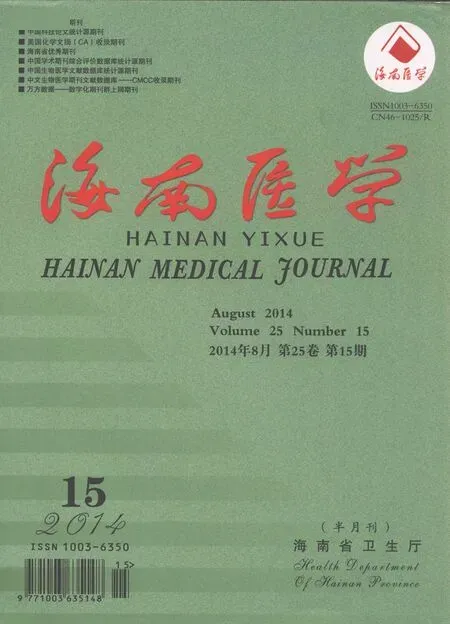雄激素对机体严重创伤后免疫反应、肝脏及心血管功能的影响
杨开超,耿 磊,朱晓光,封启明
(上海交通大学附属第六人民医院急诊科,上海 200233)
·综 述·
雄激素对机体严重创伤后免疫反应、肝脏及心血管功能的影响
杨开超,耿 磊,朱晓光,封启明
(上海交通大学附属第六人民医院急诊科,上海 200233)
动物研究证实,创伤预后存在明显的性别差异,雄性动物创伤后并发症发生率及死亡率均明显高于雌性。但是,临床关于创伤预后性别差异的研究则一直存在争议。实验室研究证实,雄性动物创伤后机体免疫反应及各脏器功能明显受到抑制,而睾丸切除或服用雄激素受体抑制剂后上述抑制作用得到明显改善。关于性激素水平对创伤后机体免疫反应的研究发现,雌激素具有免疫增强作用;而相反,雄激素则会诱导免疫抑制。本文主要阐述雄激素水平变化对机体创伤后免疫反应、肝脏及心血管系统功能的影响作用,进一步分析创伤预后性别差异的潜在机制,从而在动物研究的结果中寻求新的干预措施来改善创伤患者的预后。
创伤;雄激素;免疫反应;肝脏;心血管
动物研究证实,创伤预后存在明显的性别差异。而临床研究对此却一直存在争议,部分研究表明女性创伤患者创伤后死亡率或严重并发症发生率明显低于男性[1-7],而还有一部分研究则认为女性患者预后与男性相比无明显差异[8-9]。研究还发现创伤患者预后性别差异具有年龄特异性。Wohltmann等[3]对约2万创伤患者分析发现,年龄<50岁的女性严重创伤患者亡率明显低于同龄男性,而年龄≥50岁的女性患者与同龄男性相比无明显差异。Frink等[10]研究也发现年龄<50女性严重创伤患者MOF及脓毒症的发生率均明显低于同龄男性患者。动物研究表现为雄性动物创伤后机体免疫反应及各脏器功能均受到抑制,而发情期雌性动物创伤后则表现为免疫增强,各脏器功能维持在正常水平[11-12]。机体创伤失血后免疫反应及各脏器功能依赖于性激素水平的变化,不同类型或不同水平的性激素均有可能导致创伤后机体免疫反应及各脏器功能变化的性别差异。女性在50岁左右经历绝经期,绝经后女性体内雌激素水平下降,而雄激素水平则无明显变化。而还有研究发现,男性雄激素水平会随着年龄的增长而逐渐下降[13]。动物研究证实雌激素具有免疫保护作用,而雄激素则诱导免疫抑制。本文主要阐述在动物研究中雄激素水平对创伤后机体免疫反应、肝脏及心血管系统的影响作用,进一步探讨创伤预后性别差异的潜在机制。
1 雄激素水平的动态变化
雄激素主要以睾酮为主,研究发现睾酮水平会随着年龄的增加逐渐下降。男性在30岁左右睾酮水平达到高峰,之后平均每年下降约1%,约有20%的男性在60岁以后,50%的男性在80岁以后血浆睾酮水平低于年轻男性血浆睾酮的正常下限[13-14]。循环系统中的睾酮大约有98%都绑定在血浆蛋白上,而性激素结合球蛋白(SHBG)正是血浆及白蛋白中睾酮的主要结合蛋白,只有1%~2%的睾酮处于游离状态。因为睾酮与SHBG之间具有高亲和力,所以与SHBG结合的睾酮无法为组织所利用。然而,睾酮与白蛋白的亲和力较低,与白蛋白结合及循环中游离的睾酮对各组织来说才具有生物活性。研究发现血浆中SHBG的浓度会随着年龄的增长而上升,所以结合性睾酮的比例也就会随之增加,相反,具有生物活性的睾酮水平就会随之下降。因此,有很大一部分老年人血浆中具有生物活性的睾酮水平要明显低于年轻男性的正常水平的下限[13-15]。
2 雄激素对机体创伤后免疫、肝脏及心血管功能的影响
2.1 雄激素对免疫反应的影响 创伤后机体过度的炎症反应(SIRS)及免疫抑制在脓毒症及MODS的发生过程中起重要作用[16]。与雌二醇相反,睾酮对创伤后机体免疫功能产生抑制作用,而雄鼠睾丸切除后机体睾酮水平明显下降,机体免疫功能则得到明显改善。巨噬细胞在调节创伤后机体的免疫反应中起重要作用。研究发现雄鼠创伤后脾细胞增殖能力明显下降,脾细胞IL-2、3释放能力明显下降,脾脏及腹膜巨噬细胞IL-1、6释放能力下降;而睾丸切除雄鼠创伤后脾细胞、脾脏及腹膜巨噬细胞上述炎症因子释放水平均明显上升,同时脾细胞增殖能力也得到明显改善[17-18]。Samy等[19]称创伤失血能够降低T淋巴细胞IL-6的释放水平,而预先服用雄激素受体抑制剂(氟他米特)能够明显改善T淋巴细胞IL-6的释放水平。Angele等[20]研究发现睾丸切除雄鼠创伤失血前后脾脏及腹膜巨噬细胞促炎因子IL-1β、IL-6及抗炎因子IL-10释放水平无明显变化,而预先给予DHT的睾丸切除雄鼠创伤失血后脾脏及腹膜巨噬细胞IL-1β、IL-6释放水平明显下降,IL-10释放水平则明显上升。Angele等[21]另一项研究发现睾丸切除雄鼠创伤失血前后脾细胞TH1细胞因子(IL-2、3,INF-γ)及TH2细胞因子(IL-10)释放水平均无明显变化,预先给予DHT后,IL-2、3,INF-γ的释放水平明显下降,而IL-10释放水平则明显增加。Mayr等[22]研究还发现雄鼠创伤后免疫抑制可能与其脾脏及腹膜巨噬细胞MHC-Ⅱ(Ia)表达抑制有关。Angele等[23]研究还发现雄鼠创伤后免疫抑制可能与细胞p38磷酸化有关,雄鼠创伤后脾脏及腹膜巨噬细胞p38磷酸化增加,预先睾丸切除后则可以抑制雌鼠p38蛋白磷酸化增加,而给予双氢睾酮(DHT)的睾丸切除雄鼠p38蛋白磷酸化则再次增加。4-羟基-雄烯二酮(4-OHA)为5α-还原酶抑制剂,而后者介导睾酮向DHT的转化。雄鼠创伤后T淋巴细胞5α-还原酶表达及其活性增加,进而睾酮向双清睾酮转化增加,从而诱导免疫抑制作用的产生[24]。Schneider等[25]研究也发现雄鼠创伤后血浆TNF-α、IL-6及IL-10水平上升,脾脏巨噬细胞TNF-α及IL-6释放水平明显下降,IL-10的释放水平升高;而给予4-OHA后血浆TNF-α、IL-6及IL-10水平明显下降,且巨噬细胞TNF-α、IL-6及IL-10释放水平均趋于正常化。
2.2 雄激素肝脏功能的影响 创伤会导致肝脏功能损伤,表现为肝脏α-谷胱甘肽s-转移酶水平、髓过氧化酶活性、硝基酪氨酸形成明显增加,而睾丸切除能够明显改善上述指标[26-27]。IL-6是一种多效性细胞因子,创伤后IL-6具有免疫抑制介质作用,研究发现创伤后血浆IL-6及肝脏IL-6 mRNA表达水平也明显增加[26]。IL-6水平升高与宿主免疫功能改变及感染并发症相关。枯否细胞是IL-6的主要来源,创伤后肝脏枯否细胞IL-6释放水平增加[18],而睾丸切除后雄鼠创伤后枯否细胞IL-6释放水平则明显下降,给予DHT后IL-6释放水平则再次增加[20],这可能是雄激素导致机体免疫抑制的一个潜在机制。ICAM-1是细胞粘附分子中免疫球蛋白超家族的一员,其在活化的血管内皮细胞中表达,对调节白细胞跨血管内皮细胞运动和炎症反应起重要作用。趋化因子,如细胞诱导中性粒细胞趋化因子(CINC)-1及CINC-3对中性粒细胞具有很强的趋化作用,可诱导中性粒细胞积聚,创伤后趋化因子产生过多会导致肝脏损伤,而中性粒细胞积聚减少能够改善创伤后各器官的损伤程度[28]。Shimizu等[26]研究发现,创伤会导致肝脏NF-κB的DNA结合活性,细胞间粘附分子-1蛋白表达及中性粒细胞趋化因子(CINC-1和CINC-3)水平明显增加;而该研究还发现,氟他米特能够通过雌激素受体途径降低NF-κB DNA的结合活性,抑制肝脏NF-κB活化,下调肝脏CINC-1、CINC-3及ICAM-1的表达水平,减少中性粒细胞积,从而改善肝脏损伤程度。大量证据表明,血红素氧合酶(HO)-1可以降低各种细胞因子、粘附分子及趋化因子的表达,抑制中性粒细胞积聚,改善休克导致的器官损伤,而且氟他米特恰恰能够增强HO-1表达[28]。此外,氟他米特还可以通过减少肝脏炎症反应、氧化应激及细胞凋亡作用,从而改善肝脏的损伤程度。Kan等[27]研究发现创伤后雄鼠血浆及肝脏(组织、肝细胞及枯否细胞)TNF-α、IL-6、角质细胞源性趋化因子及单核细胞趋化蛋白-1表达水平明显升高,而氟他米特可以降低上述因子的表达水平;该研究还发现创伤后肝脏诱导型一氧化氮合酶表达增加,且肝细胞及肝脏枯否细胞DNA断裂也增加,而氟他米特同样可以改善上述情况。Schneider等[25]研究发现创伤后雄鼠枯否细胞噬细胞TNF-α、IL-6及IL-10释放水平上升,而4-OHA能够降低上述因子的表达水平。
2.3 雄激素对心血管功能的影响 创伤后心输出量、心搏量及心肌收缩力明显下降,总外周阻力升高;而睾丸切除雄鼠心输出量、心搏量及心肌收缩力较前上升,总外周阻力则较前下降[29-33]。雄激素受体拮抗剂氟他米特同样也能够增加心输出量、心搏量及心肌收缩力,降低总外周阻力[31,33-34]。此外,研究发现创伤后心肌细胞IL-6水平与心功能呈负相关[30,34]。Yang等[29]研究发现创伤后心脏IL-6蛋白水平、心肌细胞内IL-6水平及心肌细胞IL-6 mRNA表达明显升高,而睾丸切除雄鼠创伤后心脏IL-6蛋白水平及心肌细胞内IL-6水平上升水平明显降低,但心肌细胞IL-6 mRNA表达水平仍明显增加。此外,研究还发现雄鼠创伤后心肌细胞ER-α and ER-β mRNA及蛋白表达下降,有意思的是,氟他米特能够增加ER-α and ER-βmRNA及蛋白表达[32-33]。Hsieh等[31]研究发现创伤后心脏过氧化物酶体增生物激活受体γ共激活因子1(PGC-1)蛋白表达水平明显下降,氟他米特能够增加PGC-1的蛋白表达,而雌激素受体拮抗剂(ICI)则能够阻断氟他米特上述作用。该研究还发现创伤后心肌细胞线粒体中ATP含量明显下降,而预先给予氟他米特后雄鼠心肌细胞线粒体中ATP含量明显改善。
综上所述,雄激素能够抑制机体创伤后的免疫反应,损伤肝脏及心血管功能,而睾丸切除或服用雄激素受体拮抗剂氟他米特能够明显改善上述有害作用,且该作用部分依赖雌激素受体途径实现。此外,雄激素水平会随着年龄的增加而逐渐下降。因此,雄激素水平的动态变化及其对创伤后机体各系统功能的有害作用可能是导致预后性别差异的重要影响因素。氟他米特作为一种新的治疗措施,可能有利于改善创伤患者的预后。
3 局限性及未来研究方向
临床对于创伤患者预后性别差异的研究结果还存在争议,预后性别差异的机制也不清楚。目前关于性激素水平与创伤预后的研究主要集中于动物实验,性激素水平与创伤患者预后的相关性及其对患者预后的影响作用我们还不清楚,女性患者绝经后雌激素水平的下降或男性患者雄激素水平随着年龄增长而逐渐地下降均有可能影响患者的预后;一种或多种性激素以及其他因素如X染色体相关基因多态性,均有可能是创伤患者预后性别差异的影响因素。我们需要进行更多的临床研究来证实创伤患者预后性别差异的存在。同时,我们还需要进一步分析创伤时患者血浆性激素水平、后期性激素水平的动态变化及其峰值与预后的关系,探索性激素影响创伤患者预后的具体机制,从而寻找新颖的有效的干预措施来减少创伤后各种严重并发症的发生率,降低死亡率。
[1]HaiderAH,Crompton JG,Oyetunji T,et al.Females have fewer complications and lower mortality following trauma than similarly injured males:A risk adjusted analysis of adults in the national trauma data bank[J].Surgery,2009,146(2):308-315.
[2]Haider AH,Crompton JG,Chang DC,et al.Evidence of hormonal basis for improved survival among females with trauma-associated shock:An analysis of the national trauma data bank[J].J Trauma, 2010,69(3):537-540.
[3]Wohltmann CD,Franklin GA,Boaz PW,et al.A multicenter evaluation of whether gender dimorphism affects survival after trauma[J]. Am J Surg,2001,181(4):297-300.
[4]George RL,McGwin Jr G,Windham ST,et al.Age-related gender differential in outcome after blunt or penetrating trauma[J].Shock, 2003,19(1):28-32.
[5]Gannon CJ,Pasquale M,Tracy JK,et al.Male gender is associated with increased risk for postinjury pneumonia[J].Shock,2004,21 (5):410-414.
[6]Magnotti LJ,Fischer PE,Zarzaur BL,et al.Impact of gender on outcomes after blunt injury:A definitive analysis of more than 36,000 trauma patients[J].JAm Coll Surg,2008,206(5):984-991.
[7] Sperry JL,Vodovotz Y,Ferrell RE,et al.Racial disparities and sex-based outcomes differences after severe injury[J].J Am Coll Surg,2012,214(6):973-980.
[8]Napolitano LM,Greco ME,Rodriguez A,et al.Gender differences in adverse outcomes after blunt trauma[J].J Trauma,2001,50(2): 274-280.
[9]Bowles BJ,Roth B,Demetriades D.Sexual dimorphism in trauma? A retrospective evaluation of outcome[J].Injury,2003,34(1): 27-31.
[10]Frink M,Pape H-C,van Griensven M,et al.Influence of sex and age on mods and cytokines after multiple injuries[J].Shock,2007, 27(2):151-156.
[11]Kawasaki T,Chaudry IH.The effects of estrogen on various organs: Therapeutic approach for sepsis,trauma,and reperfusion injury. Part 2:Liver,intestine,spleen,and kidney[J].Journal of Anesthesia,2012,26(6):892-899.
[12]Kawasaki T,Chaudry IH.The effects of estrogen on various organs: Therapeutic approach for sepsis,trauma,and reperfusion injury. Part 1:Central nervous system,lung,and heart[J].J Anesth,2012, 26(6):883-891.
[13]Matsumoto AM.Andropause clinical implications of the decline in serum testosterone levels with aging in men[J].The Journals of Gerontology Series A:Biological Sciences and Medical Sciences, 2002,57(2):M76-M99.
[14]Harman SM,Metter EJ,Tobin JD,et al.Longitudinal effects of aging on serum total and free testosterone levels in healthy men[J].Journal of Clinical Endocrinology&Metabolism,2001,86(2):724-731.
[15]Morley JE,Charlton E,Patrick P,et al.Validation of a screening questionnaire for androgen deficiency in aging males[J].Metabolism,2000,49(9):1239-1242.
[16]Hildebrand F,Hubbard WJ,Choudhry MA,et al.Effects of 17β-estradiol and flutamide on inflammatory response and distant organ damage following trauma-hemorrhage in metestrus females[J]. Journal of Leukocyte Biology,2006,80(4):759-765.
[17]Wichmann MW,Zellweger R,DeMaso CM,et al.Enhanced immune responses in females,as opposed to decreased responses in males following haemorrhagic shock and resuscitation[J].Cytokine,1996,8(11):853-863.
[18]Wichmann MW,Ayala A,Chaudry IH.Male sex steroids are responsible for depressing macrophage immune function after trauma-hemorrhage[J].American Journal of Physiology-Cell Physiology,1997, 273(4):C1335-C1340.
[19]Samy AT,Schwacha MG,Cioffi WG,et al.Androgen and estrogen receptors in splenic t lymphocytes:Effects of flutamide and trauma-hemorrhage[J].Shock,2000,14(4):465-470.
[20]Angele MK,Knöferl MW,Schwacha MG,et al.Sex steroids regulate pro-and anti-inflammatory cytokine release by macrophages after trauma-hemorrhage[J].American Journal of Physiology-Cell Physiology,1999,277(1):C35-C42.
[21]Angele MK,Knǒferl MW,Ayala A,et al.Testosterone and estrogen differently effect th1 and th2 cytokine release following trauma-haemorrhage[J].Cytokine,2001,16(1):22-30.
[22]Mayr S,Walz C,Angele P,et al.Castration prevents suppression of mhc class ii(ia)expression on macrophages after trauma-hemorrhage[J].Journal ofApplied Physiology,2006,101(2):448-453.
[23]Angele MK,Nitsch S,Knöferl MW,et al.Sex-specific p38 map kinase activation following trauma-hemorrhage:Involvement of testosterone and estradiol[J].American Journal of Physiology-EndocrinologyAnd Metabolism,2003,285(1):E189-E196.
[24]Samy TA,Knöferl MW,Zheng R,et al.Divergent immune responses in male and female mice after trauma-hemorrhage:Dimorphic alterations in t lymphocyte steroidogenic enzyme activities[J].Endocrinology,2001,142(8):3519-3529.
[25]Schneider CP,Schwacha MG,Samy TA,et al.Androgen-mediated modulation of macrophage function after trauma-hemorrhage:Central role of 5α-dihydrotestosterone[J].Journal of Applied Physiology,2003,95(1):104-112.
[26]Shimizu T,Yu HP,Hsieh YC,et al.Flutamide attenuates pro-inflammatory cytokine production and hepatic injury following trauma-hemorrhage via estrogen receptor-related pathway[J].Ann Surg,2007,245(2):297-304.
[27]Kan WH,Hsieh CH,Schwacha MG,et al.Flutamide protects against trauma-hemorrhage-induced liver injury via attenuation of the inflammatory response,oxidative stress,and apopotosis[J]. Journal ofApplied Physiology,2008,105(2):595-602.
[28]Yu HP,Yang SC,Lau YT,et al.Role of akt-dependent up-regulation of hemeoxygenase-1 in resveratrol-mediated attenuation of hepatic injury after trauma hemorrhage[J].Surgery,2010,148(1):103-109.
[29]Yang S,Zheng R,Hu S,et al.Mechanism of cardiac depression after trauma-hemorrhage:Increased cardiomyocyte il-6 and effect of sex steroids on il-6 regulation and cardiac function[J].American Journal of Physiology-Heart and Circulatory Physiology,2004,287 (5):2183-2191.
[30]Mizushima Y,Wang P,Jarrar D,et al.Estradiol administration after trauma-hemorrhage improves cardiovascular and hepatocellular functions in male animals[J].Ann Surg,2000,232(5):673-679.
[31]Hsieh YC,Yang S,Choudhry MA,et al.Pgc-1 upregulation via estrogen receptors:A common mechanism of salutary effects of estrogen and flutamide on heart function after trauma-hemorrhage[J]. American Journal of Physiology-Heart and Circulatory Physiology, 2005,289(6):H2665-H2672.
[32]Yu HP,Yang S,Choudhry MA,et al.Mechanism responsible for the salutary effects of flutamide on cardiac performance after trauma-hemorrhagic shock:Upregulation of cardiomyocyte estrogen receptors[J].Surgery,2005,138(1):85-92.
[33]Chaudry IH,Moeinpour F,Wang WK,et al.Sex hormones and gender effects following trauma-hemorrhage[J].Signa Vitae,2010,5 (Suppl.1):24-27.
[34]Remmers DE,Wang P,Cioffi WG,et al.Testosterone receptor blockade after trauma-hemorrhage improves cardiac and hepatic functions in males[J].American Journal of Physiology-Heart and Circulatory Physiology,1997,273(6):2919-2925.
Effect of androgen on immune response,hepatic and cardiovascular functions after severely traumatic injury
YANG Kai-chao,GENG Lei,ZHU Xiao-guang,FENG Qi-ming
Department of Emergency Medicine,Shanghai Jiao Tong University Affiliated Sixth People's Hospital,Shanghai 200233,CHINA
It was well known that sexual difference exists in prognosis of trauma.Studies had revealed that there was a significantly higher incidence of life-threatening complications and mortality in traumatized males than in females.However,clinical studies had showed controversial results on the role of gender in outcomes of severe traumatic patients.Laboratory studies of trauma had confirmed that immune response was markedly depressed in males but was normalized in castrated males.Moreover,administration of testosterone receptor antagonist following trauma-hemorrhage could also improve immune,hepatic and cardiovascular functions.Several studies were conducted to explore the effect of sex hormones on immune response and organ functions following trauma.These results had showed that estrogen played an important role in mediating immunoprotective effects.In contrast,androgen was immunosuppressive.In this review,we discussed the effect of androgen on immune response,hepatic and cardiovascular functions in an experimental model of trauma-hemorrhage,and further analyzed the potential mechanism which responsible for gender dimorphism in outcomes of trauma patients.The results gained from the experimental studies would be helpful in designing innovative therapeutic approaches for the treatment of trauma patients.
Trauma;Androgen;Immune response;Hepatic;Cardiovascular
R641
A
1003—6350(2014)15—2249—04
10.3969/j.issn.1003-6350.2014.15.0874
2014-02-12)
上海市科学技术委员会科研计划项目(编号:12410710700)
封启明。E-mail:fengqiming04@126.com

